Mental preparation for photography is just as important, if not more so, than the physical preparation of planning your trip, packing your camera gear and traveling to the shooting location. If we are not in the proper mental space to be creative, to create art, to see the world around us through our artistic vision, then we will not make meaningful photographs.
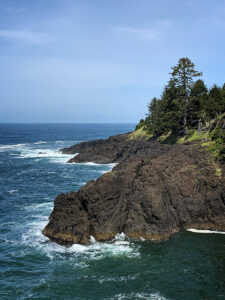 I’m writing this while at the Oregon Coast, preparing for my next workshop that starts tomorrow. This topic of mental preparation rang very true for me yesterday as I drove from my home to the coast. About 30 minutes from home, I had the realization that compared to other trips, my head was not in the game, I wasn’t mentally prepared to be artistic, nor help others to unleash their creative potential. It was like a big lightbulb went off over my head when this realization hit. Once I accepted this reality, my next thought was thankfulness that I had this realization very early in the trip. If I didn’t have this ah-ha moment, I might have been mentally struggling and not feeling creative and without this realization, I might have been frustrated. So it was great that this realization came early so I could begin to address it and get my head in the game.
I’m writing this while at the Oregon Coast, preparing for my next workshop that starts tomorrow. This topic of mental preparation rang very true for me yesterday as I drove from my home to the coast. About 30 minutes from home, I had the realization that compared to other trips, my head was not in the game, I wasn’t mentally prepared to be artistic, nor help others to unleash their creative potential. It was like a big lightbulb went off over my head when this realization hit. Once I accepted this reality, my next thought was thankfulness that I had this realization very early in the trip. If I didn’t have this ah-ha moment, I might have been mentally struggling and not feeling creative and without this realization, I might have been frustrated. So it was great that this realization came early so I could begin to address it and get my head in the game.
We all have a life outside of photography, filled with family, friends, jobs, lawn mowing, dog walking, bill paying, etc…there are a lot of tasks and distractions that we all do every single day just to keep life moving. Then, when it’s time to go shooting, we somehow have to switch all of that off and be present in the moment and unleash our full creative potential. HA! Good luck! Mental preparation is not something we’re thinking about around the house dealing with our day to day lives. It’s tough to mentally dis-engage from our normal routines in order to be fully present in our surroundings while we’re photographing. Although I photograph and teach quite often, I still struggle with putting aside my home life in order to be fully present and engaged in creative tasks.
I’m a strong believer that for me I need to have a strong sense of self-awareness and presence of mind to create my most meaningful work. I want to be in touch with what I’m feeling while on location, feelings both from the inside and what’s going on with me, and, how I’m feeling and reacting to the location I’m at.  This awareness helps me create more connective photographs, more meaningful compositions and possibly better story-telling in what I capture and how I do it. Throughout my life I’ve worked to build my self-awareness, get more in touch with my feelings and reactions in the moment and block out the rest of the mental noise that can be going on in my head. It’s not an easy skill to develop, but one that I value a lot, so I wanted to build this “skill” more fully in myself.
This awareness helps me create more connective photographs, more meaningful compositions and possibly better story-telling in what I capture and how I do it. Throughout my life I’ve worked to build my self-awareness, get more in touch with my feelings and reactions in the moment and block out the rest of the mental noise that can be going on in my head. It’s not an easy skill to develop, but one that I value a lot, so I wanted to build this “skill” more fully in myself.
So many of us have time pressures and put expectations on ourselves to create something good when we’re out shooting. In fact they are very, very counter-productive to being creative. These kinds of thoughts put extra pressure on us, increasing our anxiety and closing us off from being open and receptive to what’s going on around us. Not to mention all of the things that we need to do when we get back home which may be running through our heads as we are trying to be creative.
Normally before a photo outing or workshop, I begin to prepare my mind to be creative long before I leave the house. As I’m packing my gear or clothes, I am beginning to think about the experience ahead, thinking about setting aside all of the household thoughts, thinking about patterns/shapes/textures/colors, etc. It’s a way of opening up my mind to be receptive to seeing creatively. Then as I travel to a location, my vision begins to shift more critically to the quality of light, interesting subjects or scenes, framing up compositions in my mind. I consider this a “warm up” of my “creative muscles” before I get to the location.
So as I was driving to the coast, I realized I had not put aside any of my hectic household thoughts of family, dogs, chores, bills, etc…I had brought them all along with my on the ride and I wasn’t opening up creatively! As soon as I had this realization, I started mentally putting each of the distracting thoughts away in a mental file drawer, ready to be pulled out after the workshop and made a plan to begin to shift my vision and thinking to be more creative.
The first thing I did was relax any expectations I had for the day. Yes, I needed to make it to the coast and get settled, but I relaxed any time pressures I might have had in my head about WHEN I needed to arrive. I lifted my foot off of the gas pedal and began to enjoy the ride. I would get there when I got there and I still had enough time for the tasks of scouting and preparation before the workshop begins.
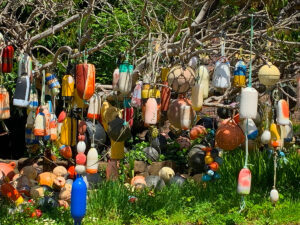 Since I now had some extra time on my hands, I made a point to stop at various points along the road just to get out of the car and smell the salt air, or check out something I hadn’t seen, or visited in a long time. This was a fantastic exercise for relaxing me as well as helping me get in tune with my coastal environment. All along the Oregon Coast there are numerous pull-outs and state parks that are cool to check out. So, I made a point to stop at a few. And, I didn’t get out my camera! I purposefully left it in the truck so I didn’t feel any pressure to try
Since I now had some extra time on my hands, I made a point to stop at various points along the road just to get out of the car and smell the salt air, or check out something I hadn’t seen, or visited in a long time. This was a fantastic exercise for relaxing me as well as helping me get in tune with my coastal environment. All along the Oregon Coast there are numerous pull-outs and state parks that are cool to check out. So, I made a point to stop at a few. And, I didn’t get out my camera! I purposefully left it in the truck so I didn’t feel any pressure to try 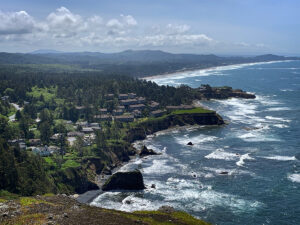 and create a nice photograph. Instead, I just grabbed my iPhone and snapped a few touristy snapshots. Not that I particularly wanted the images, but the act of doing so started me “seeing” more artistically. All of the images in this post were just quick snaps with the phone.
and create a nice photograph. Instead, I just grabbed my iPhone and snapped a few touristy snapshots. Not that I particularly wanted the images, but the act of doing so started me “seeing” more artistically. All of the images in this post were just quick snaps with the phone.
It also forced me to SLOW DOWN! This is something I preach a lot to folks I work with as it is the foundation for “seeing” and “feeling” and story-telling. You can’t “get in” to a scene and translate it in a photograph if you are rushing around firing off shots like crazy. Slowing down, in photography and in life, is a huge key to success.
As I meandered down the coast, I sensed myself starting to relax more, to slow down even more, to move out of the hectic city life towards the focused creative space where I wanted to be. I eventually made it to my lodging in Yachats in 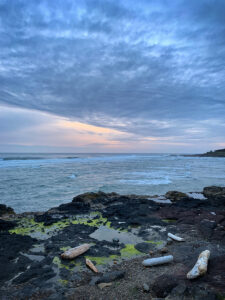 plenty of time and feeling like I was getting in the creative zone. I unloaded my truck and set up my mobile office space. After a bit of work I had a bite to eat, feeling relaxed. I needed to get out and scout a couple of locations in the evening (and many more the next day) so I prepared to head out. I did NOT take my camera with me. I wanted just to observe, see and feel the locations I would visit. Again, not putting too much pressure on myself to have to create. I took a nice walk along the ocean checking out a couple of trails and then drove for a bit until I stopped at an overlook to watch the somewhat cloudy sunset. I will admit I took a couple of shots, but only with my iPhone. My mental preparation was about locations, not creating artistic images.
plenty of time and feeling like I was getting in the creative zone. I unloaded my truck and set up my mobile office space. After a bit of work I had a bite to eat, feeling relaxed. I needed to get out and scout a couple of locations in the evening (and many more the next day) so I prepared to head out. I did NOT take my camera with me. I wanted just to observe, see and feel the locations I would visit. Again, not putting too much pressure on myself to have to create. I took a nice walk along the ocean checking out a couple of trails and then drove for a bit until I stopped at an overlook to watch the somewhat cloudy sunset. I will admit I took a couple of shots, but only with my iPhone. My mental preparation was about locations, not creating artistic images.
When the workshop begins, I feel now that I will have completed all the mental preparation I need to be fully in the creative zone in order inspire and teach others to create better images, plus I may create a few of my own. It is very much a conscious effort to get our heads prepared just as much as charging our camera batteries and cleaning our lenses. In fact, it is something you can’t “fix in post”…either you are in the creative zone or not and no amount of sliders or cropping can fix that. You owe it to yourself to actively engage in mental preparation before you next photo shoot so you can do your best work!

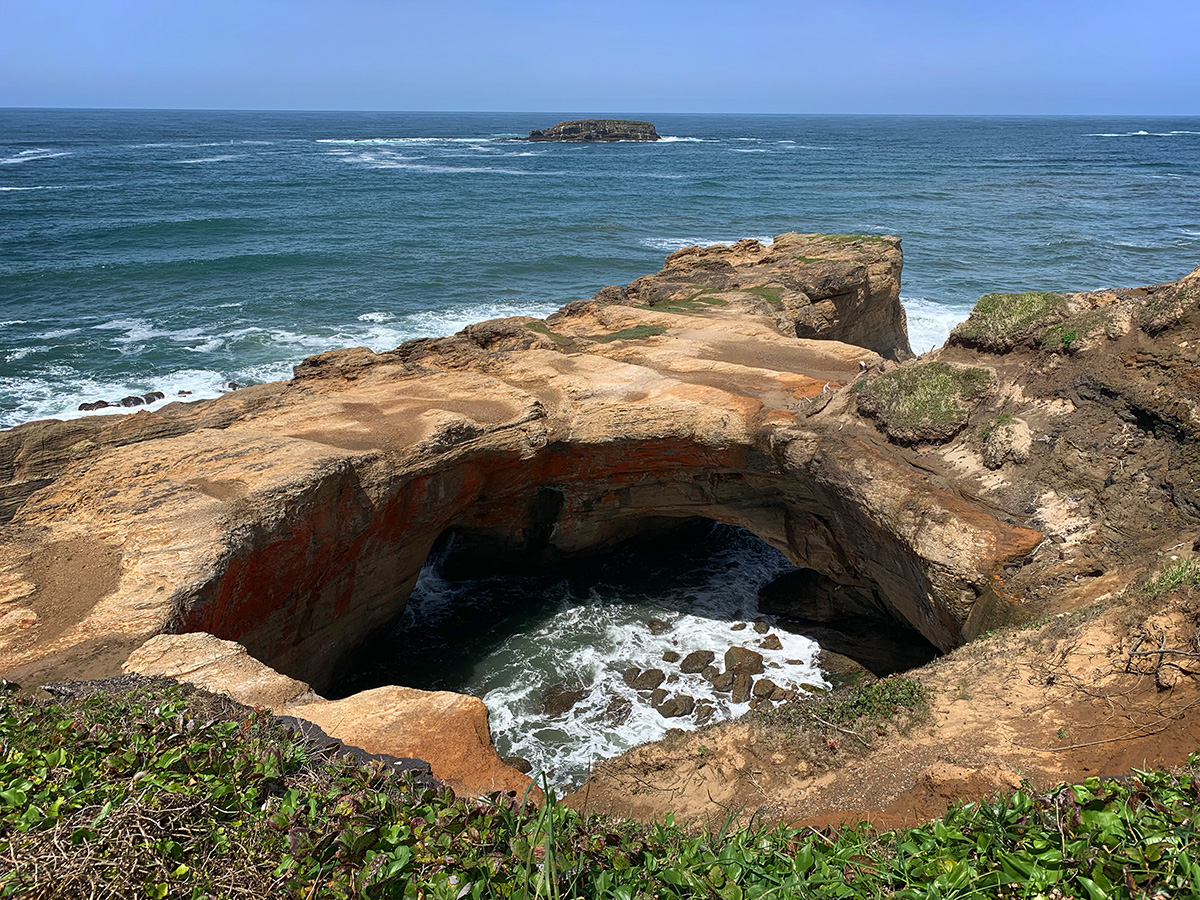
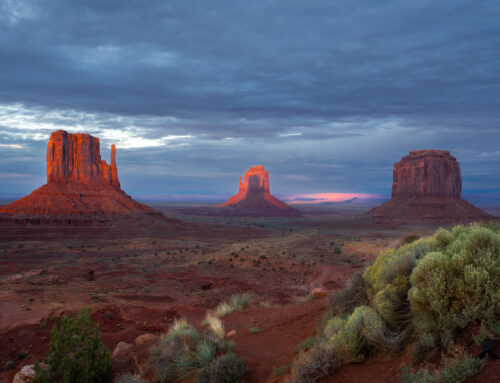
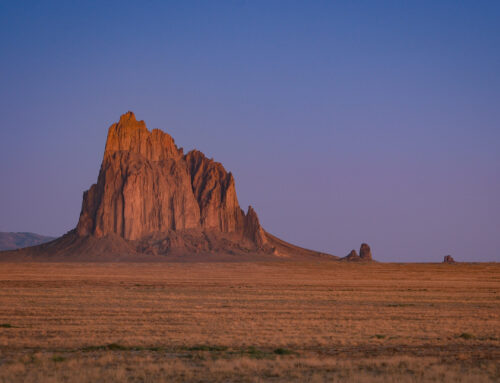
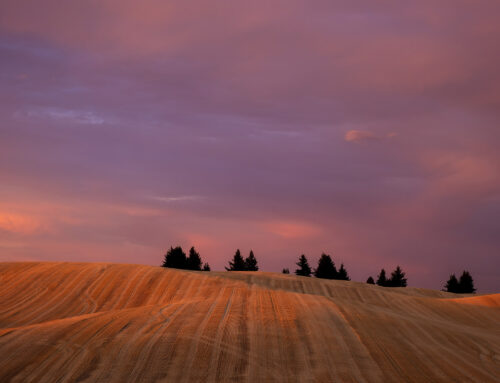
Leave A Comment